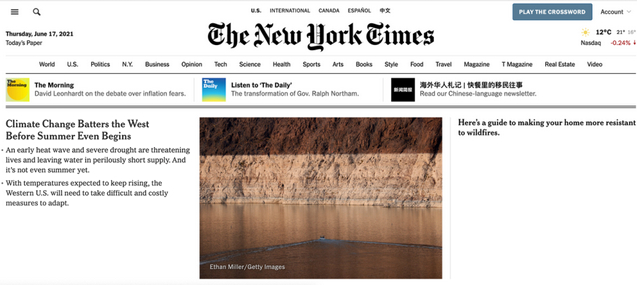 |
More than 30 newsrooms have now signed the statement (an updated list is here), but some major outlets told us privately they won’t sign. The phrase “climate emergency” sounded like activism, they said; endorsing it might make them look biased. Instead, they added, they would let their climate coverage speak for itself.But CCN points out that the whole point is that the coverage doesn’t speak for itself. We are in an emergency! Would you know that from today’s news? CCN goes on:
We’re not obsessed with whether a news outlet does or doesn’t use the term “climate emergency.” What matters is whether the outlet’s overall coverage treats climate change like an emergency.And yet, the parameters of the language convey the gravity of the sitch. The Guardian realized this in 2019 and adjusted its stylebook to use climate breakdown or emergency. Two years later, the world is catching up, and what once seemed ahead of the climate curve now reads like baseline accuracy. Which is why it’s so important to default to the right language.
One of my fave climate writers suggested that refusing to sign this pledge was no biggie, because (a) reporters don’t need to wear their emergencies on their sleeves, and (b) the outlets mostly refused because they were in lefty company. (Signatories include The Guardian and Al Jazeera).
 |
Default to accuracy
Defaults simplify our lives. And if climate change is the default, anything beyond those words will seem over-the-top. But anything less than an accurate definition of what is happening (breakdown, crisis, emergency) undermines the severity of our situation. If we make climate crisis the default, then we diffuse its activistyness. Exactly the opposite effect of what is intended by the editorial grandees who refuse to commit to these new words.
Which is not to say there aren’t reasons you wouldn’t use the words climate emergency. If, say, you’re communicating to more conservative audiences, you would want to speak in terms that don’t alienate before you’ve finished your first sentence. But meeting people where they are in a persuasive context is very different from covering the crisis in the news. However diminished we may feel the media’s power is, we still very much take our cues from the language they use. And the prominence they give the stories of the day. I see you, New York Times, with your excellent above the fold climate coverage yesterday:
 |
Which would mean this is also journalism‘s most important decade in history. https://t.co/RqqNfXxx25Just as this is the decade for everyone and their mother to step up to the reality of climate, we need our media to shift their coverage, language, tools, and priorities. Some certainly are, but they’re being eclipsed by the breadth of the climate emergency. I get that outlets move slowly when it comes to these shifts, careful to maintain a perceived objectivity, but the objective truth is that things are much worse than they present them, and that is, objectively, a collective moral failing.
— Wolfgang Blau (@wblau) June 13, 2021
Normalize emergency
If we normalize an emergency, then what’s the point? What does it mean if a country declares a climate emergency and then goes back to eating its lunch? Well, it means that facts are on the books. A wonderful colleague who has worked in dozens of war-torn countries put it this way: Apocalypse on Monday, then the market on Tuesday, and then back to apocalypse on Wednesday. Life goes on. It’s a realistic way of neutralizing the fear we have of allowing the language of emergency to scare the bejeebus out of us. But the sooner we lean into the reality of it, the better equipped we’ll be to fight, to mitigate, to adapt. The trajectory can be changed, but it requires veracity and courage on the part of our media.
Links
- This Is Why We Should Stop Calling It Climate Change
- This Isn’t a Heatwave — It’s a Dying Planet
- The Age of Worst Case Scenarios
- The Climate Change Solution That Could Spark Global War
- Wet Bulb temperature is the scariest part of climate change you’ve never heard of
- This Statistic Changed My Entire Perspective of Climate Change
- How to Have a Useful Conversation About Climate Change in 11 Steps
- Climate Change’s Hidden Victim: Your Mental Health
- The Three Most Important Graphs in Climate Change

No comments:
Post a Comment